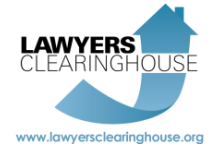The Lawyers Clearinghouse on Affordable Housing and Homelessness was founded in 1988 by the Boston Bar Association and the Massachusetts Bar Association. The Clearinghouse is governed by a 22 member board and has 4 full-time and 1 part-time (4.5 FTE) staff members. The organization runs three core programs:
The Massachusetts Legal Clinic for the Homeless & Low-Income Residents (Legal Clinics): These weekly virtual meetings connect pro bono attorneys with homeless and very ... Läs mer
The Lawyers Clearinghouse on Affordable Housing and Homelessness was founded in 1988 by the Boston Bar Association and the Massachusetts Bar Association. The Clearinghouse is governed by a 22 member board and has 4 full-time and 1 part-time (4.5 FTE) staff members. The organization runs three core programs:
The Massachusetts Legal Clinic for the Homeless & Low-Income Residents (Legal Clinics): These weekly virtual meetings connect pro bono attorneys with homeless and very low-income individuals who need legal assistance including full representation legal services. Our volunteer attorneys assist clients on a variety of issues relating to basic subsistence needs, including securing subsidized housing, applying for disability and SSI benefits, resolving immigration problems, and sealing criminal records, allowing them better access to housing and jobs. In 2021, 246 homeless and very low-income clients received legal assistance at 35 virtual/hybrid clinics. Two hundred ninety (290) pro bono attorneys and advocates participated, donating legal services valued at $5 million.
The Nonprofit Assistance Program: matches volunteer lawyers with nonprofit organizations in need of legal assistance, with a priority for serving groups that develop or sponsor affordable housing, promote economic development, or operate as homeless shelters, tenant organizations, and housing and homelessness advocacy groups. The Clearinghouse is the only statewide agency that provides pro bono legal services to nonprofit organizations. By providing legal assistance to groups, attention is directed to the system-wide problems affecting low-income people and their communities. The result is far-sighted and preventive rather than remedial. In 2021, we provided legal assistance to 170 nonprofit organizations, 20 legal workshops for nonprofits serving 492 attendees, and recruited 330 volunteer attorneys for the program (and provided 6 lawyers trainings). Volunteer attorneys donated legal services valued at approximately $4 million.
The Access to Justice Fellows Program (Fellows Program), in partnership with the SJC Access to Justice Commission, pairs retired lawyers and judges with legal services offices and nonprofit organizations for one year fellowships to increase equal justice for all. Now in its ninth year, the program recruited 16 Fellows last year who worked on a wide range of matters and innovative projects. The program has been very successful - 80% of Fellows who began during the first year of the program in 2012 are still working together. In 2021, the program facilitated the donation of thousands of hours of pro bono service.
Despite the challenges in 2021, the Clearinghouse leveraged a staff of four and budget of $480,000 to manage 700 volunteers who provided legal services worth $9 million. Over the next year, we aim to assist 250 homeless or low-income individuals and 230 nonprofit organizations with the assistance of 720 volunteer attorneys.
When the Clearinghouse was founded in 1988, only 1 in 5 low income households could expect to find housing, according to the Massachusetts Coalition for the Homeless. Sadly, the housing situation in Boston has not changed substantially in the last 30 years. The high cost of living in Boston, which has the third-highest median rents of any city in the country, means that many families—disproportionately families of color—are struggling to find adequate subsidized housing and to pay for food, health care, and child care, even with full-time jobs.
As the Greater Boston Housing Report Card (2021) concluded, COVID-19 has amplified existing inequalities in Boston where neighborhoods with non-white majorities such as Roxbury, Dorchester, and Mattapan are disproportionately impacted by housing instability (70% of citywide eviction filings), incarceration (twice the rate of all Boston residents), and unemployment (historically 70% higher than rates for the city as a whole). Homeless people in particular face extraordinary barriers to accessing legal help in Boston as their legal issues often do not fit neatly into the priority areas set by legal services and their unstable living situations make it difficult to schedule appointments. It is not surprising that many find they cannot break the cycle of poverty and homelessness and why Boston has experienced a 45% increase in homeless individuals over the last decade.
Low-income, very low-income, and homeless people in Boston are all people the Clearinghouse serves through our Legal Clinic and Nonprofit Assistance Program. The Legal Clinic is designed to reduce barriers to self-sufficiency endured by homeless and low-income individuals by providing direct, free, one-on-one legal assistance. We are the only organization providing no-cost legal services to non-Veteran homeless individuals in Boston and we are the only statewide organization that provides pro bono legal services to nonprofit organizations.
Strong staff capacity and volunteer engagement are the keys that enable us to provide a steady supply of quality free legal services in the community. Our program model relies on the volunteer efforts of lawyers that are members of the private bar. The Clearinghouse’s small staff recruit, train, coordinate, and mentor hundreds of volunteers each year.
Dölj fulltext
